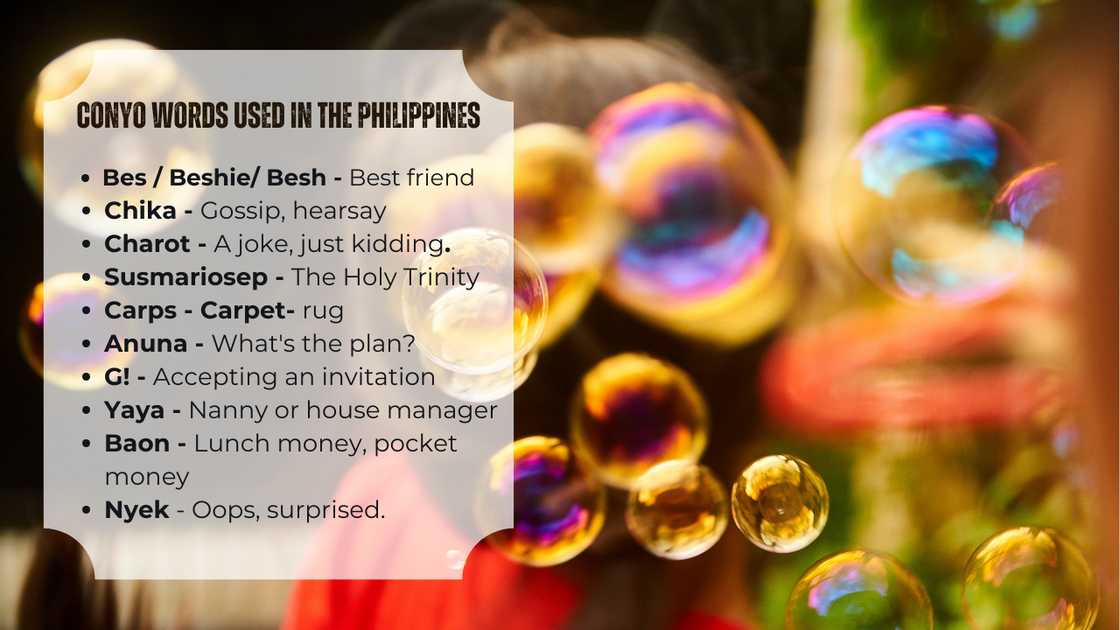What is Conyo? 25 funny words list, lines and phrases meaning
In the Philippines, conyo expressions are known for sounding playful, exaggerated, or intentionally sosyal. But what is conyo? It is a popular Filipino slang style that mixes English and Tagalog, often used humorously in casual conversations and online culture. Understanding what conyo is helps explain its strong presence in memes and everyday banter in modern Philippine society.

Source: Getty Images
TABLE OF CONTENTS
- Key takeaways
- What is conyo?
- Frequently Asked Questions
- What is conyo slang?
- What is conyo words?
- Is conyo a bad word?
- Why is it called conyo?
- Are Conyo and Taglish the same?
- Where did conyo come from?
- Why do Filipinos use conyo?
- How do you know if you're a conyo?
- What is carps in conyo?
- What is conyo slang for girl?
- What is conyo slang for a guy?
- What is conyo in Tagalog?
- What is the Filipino slang for gangster?
- What is Filipino slang for crush?
Key takeaways
- It is commonly used for humour, jokes, memes, and casual conversations rather than formal speech.
- Funny conyo words and phrases often sound sosyal, dramatic, or intentionally over-the-top.
- Understanding conyo helps explain the meaning behind popular lines and expressions used online.
- Conyo reflects modern Filipino culture and the creative blending of languages in everyday communication.
What is conyo?
Conyo, meaning in the Philippines' context, is simply an urban slang language. Filipinos also call it coño or pinoy slang. It means talking in Taglish (mixing words from Tagalog and English in sentences). Filipino youth from the upper class (the rich) and those in expensive schools also call themselves conyo.
What are the conyo words used in the Philippines?
A slang language is a unique form of communication among people of a specific subset or region. It allows them to be funny, different, friendly, or secretive. Below is a conyo words list with the latest phrases and examples of how to use them in sentences:
- Bes / Beshie/ Besh - Best friend. (Bes, I miss you. You sometimes make me go gaga?)
- Chika - Gossip, hearsay (Give the latest chika beshie. I know he took you on a date.)
- Charot - A joke, just kidding. (You know I hate you, Besh. Charot!)
- Susmariosep - The Holy Trinity, an exclamation. (Susmariosep! I can't find my phone.)
- Carps - Carpet- rug (You cannot attend my party wearing those carpetsI'm.)
- Anuna - What's the plan? (It is Friday! Anuna?)
- Starbs - Copy (Question: Can I starbs your hairstyle? Answer: Can you just not?)
- G! - Accepting an invitation, idea, or suggestion. (Question: Let's party tonight? Answer: G!)
- BV - Bad vibes (I'm not too fond of your BV.)
- Yaya - Nanny or house manager. (Did your mum hire a new yaya for your little sister?)
- Baon - Lunch money, pocket money (How much baon do you spend daily?)
- Fambam - Family. (I have dinner with the fambam tonight.)

Source: Getty Images
- Pareeee - Dude, best friend, friend. (Pareeee, I'm almost ready na.)
- Nyek - Oops, surprised. (Nyek! Is this your car?)
- Lods / Lodi - Idol, best friend (Beyoncé is my lodi, and you two are my lods.)
- Petmalu - Amazing, cool. (My sister is Petmalu)
- Mumshie - Mother. (I have to go now. Mumshie is calling.)
- Anong nangyari? - What happened? (We used to be friends. Anong nangyari?)
- Werpa - Power. (Women have their werpa.)
- Praning - Hallucinating. (Are you drunk? Bes, stop praning)
- Taratitat - Talkative (When do you ever stop taratitat?)
What are the popular conyo words?
People sometimes make friends by using slang language. Only members of their group or affiliates understand the vocabulary. The slang language aids group solidarity and helps them bond by making their conversations informal. Below are some conyo sentences with English translations:
- Let us make pasok to class. (Let us go to class.)
- Don’t make me lakad na. (Don’t make me walk any further.)
- The food is so sarap. (Complement: The food is so delicious. Response: I know, right?)
- Please make ligpit of the plates. (Please clear out the plates.)
- The girls will make bawi. I have tiwala on them that this time, they will laban. (The girls will recover. I trust them that this time, they will fight.)
- My friends are so maingay and naughty, but always tulong me with my homework. (My friends are so noisy and naughty, but they always help me with my homework.)
- I don’t like her because she is making gulo my life. (I don’t like her because she ruins my life.)
- I’m so saya today. Mumshie increased my baot. Can yours even? (I'm so happy today. My mum increased my pocket money. Can yours even?
- She is so nakakainis. Like, I can’t even. (She is so annoying. Like, I can’t even.)
- I am supposed to inom my vitamins, but I’m such makakalimutin, so later na lang.(I am supposed to take my vitamins, but quickly forget things. I'll take them later.)
- The spicy chicken is not that masarap. (The spicy chicken is not that delicious.)
- I can’t savour my matcha tea latte in complete katahimikan. (I can’t savor my matcha tea latte in complete silence.)

Source: Getty Images
What is an example of conyo English?
Filipino youths constantly share, maintain, and change slang vocabulary. Each generation keeps slang words from the older generation, discards some, invests new ones, and passes the terms to the younger generation. Below are some examples of conyo lines:
- I can’t even isip the right word to say. I hate it when she always sabi that she will sama when she really won't. (I can't even think of the right word to say. I hate it when she always says she will come with us when she won't.)
- My paps thinks I have a jowa. He asked me if I was dating when he saw me with my bes. He is so nakakatawa. (My father thinks I have a boyfriend. He asked me if I was dating when he saw me with my best friend. He is so funny.)
- She always makes gaya of everything I do. Doesn’t she have originality? I want to make usap with her and tell her that it is not nakakatuwa anymore. (She always imitates everything I do. Doesn’t she have originality? I want to talk to her and tell her that it is not funny anymore.)
- Our school vacation is so bitin. I still want to make higa on my bed for the whole day, but I can’t because there’s pasok na. (Our school vacation is so short. I still want to lie on my bed all day, but I can't because classes have already.)
- Sadly, no one will sundo you in your bahay because you still don’t have a jowa. (Sadly, no one will fetch you to your house because you still don't have a boyfriend.)
- I think she is making paramdam on me because she likes me, or I am just assumera. (I think she is hitting on me because she likes me, or I am just assuming.)
- My phone got snatched by a magnanakaw, but that is fine. I will bili na lang a new one. (My phone got snatched by a thief, but that is fine, I will buy a new one.)
- It’s raining, and I don’t have payong. Maybe I’ll just use my laptop to cover my ulo. (It’s raining, and I don’t have an umbrella. Maybe I’ll just use my laptop to cover my head.)
- I think I’m baliw na because I always isip him every time I’m mag-isa. (I think I’m crazy because I always think of him when I’m alone.)
- Are we friends na on Facebook? You should add me so that we can make usap through Messenger. (Are we already friends on Facebook? You should add me so that we can talk through Messenger.)

Read also
Mark Herras and Nicole Donesa spark breakup rumors after Instagram unfollow and emotional post
Frequently Asked Questions
To help clarify common curiosities and provide quick explanations, here are some frequently asked questions about Conyo language, its meanings, and how it’s used in everyday conversations.
What is conyo slang?
Conyo slang is a Filipino way of speaking that mixes English and Tagalog in the same sentence, usually in a casual and playful manner. It is often used to sound sosyal, expressive, or intentionally funny rather than formal.
What is conyo words?
Conyo words refer to a Philippine slang commonly used by affluent, urban youth. It is characterised by switching between English and Tagalog (Taglish), often delivered with a distinct and sometimes exaggerated maarte (classy or choosy) accent. Here is a Conyo meaning example;
Example: “Like, hindi ako ready today, super pagod ako.” (Meaning: “I’m not ready today because I’m really tired.”)
Is conyo a bad word?
No, Conyo is not a bad word. It’s a slang term that describes a way of speaking—mixing English and Tagalog (Taglish) playfully or exaggeratedly. While it’s sometimes used jokingly or teasingly to poke fun at someone’s style or accent, it isn’t offensive on its own. It’s more about tone and context than being vulgar.
Why is it called conyo?
The term “Conyo” comes from Philippine slang and is believed to have originated as a humorous label for wealthy, upper-class youth who spoke in a mix of English and Tagalog.
Are Conyo and Taglish the same?
Conyo and Taglish are not the same, though they overlap. Taglish is a broad, common mix of Tagalog and English.
Where did conyo come from?
The Philippines adopted the term Conyo in the 19th century during the colonial period. The word referred to the wealthy members of Filipino society. It was also used to describe Peninsular Spanish immigrants, who enjoyed using the phrase co~no as a curse word.
Why do Filipinos use conyo?
During the colonial period in the Philippines, English and Spanish speakers talked to native Filipinos in Conyo. They mixed English and Spanish with some Filipino words in their sentences.
The language gradually spread among the native Filipino middle class. Filipinos used Conyo to establish potential relationships among themselves and with English and Spanish speakers. It is today's most popular slang language among the Filipino youth.
How do you know if you're a conyo?
The Philippines understands Conyo as a language (Tagalog mixed with English) and a class of people (kids from wealthy backgrounds). According to Cosmopolitan magazine, here are some attributes of a Conyo kid:
- You drive to school in your car or have a chauffeur.
- You own some of the latest Apple products and wear fashionable clothing.
- You speak sophisticated English, but can also speak the Conyo language.
- You speak slang English, e.g., "I can't even," "You make me go gaga?" "Can you just not?" and "I know, right?"
- You are never home for the weekend because you attend luxury events like music concerts.
- You need to eat or know Filipino street food.
- You eat good food at expensive restaurants and coffee shops.
- You flaunt your expensive lifestyle on social media.
What is carps in conyo?
Carps means a rug or carpet in English and filthy fabrics or clothes in Conyo. An example in sentences is, "Your curtains are carps. I will bring you classy ones over the weekend."
What is conyo slang for girl?
A woman or maiden is called Tsika in Tagalog slang. Pinay refers to a female, while Pinoy refers to both male and female.
What is conyo slang for a guy?
Conyo slang for a guy refers to a male who speaks in the playful, mixed-language style of conyo—switching between English and Tagalog (Taglish) in conversation.
What is conyo in Tagalog?
“Conyo” (sometimes spelt conio or konyo) in Tagalog refers to a typically upper-class, wealthy Filipino who speaks a mix of English and Tagalog (Taglish), often with a distinct and sometimes exaggerated accent.
What is the Filipino slang for gangster?
Filipino slang word for gangster is sángganó. It means a parasite, a loser, someone who cannot do anything, or a gangster.
What is Filipino slang for crush?
A crush is called killing in the Philippine slang culture. The word means feeling excited when with someone you love or watching someone propose to another person in excitement.
Learning what conyo is makes it easier to appreciate the humour behind these funny words and phrases. It reflects how Filipinos naturally blend languages to express personality, emotion, and style. Today, conyo remains a lighthearted and recognisable part of modern Filipino culture.
Kami.com.ph listed the most beautiful Filipino actresses and stars. The article lists new actresses and those who have been in the industry for decades.
The post also has each actress's short bio, latest pictures, ages, spouses, boyfriends, children, etc.
Source: KAMI.com.gh








